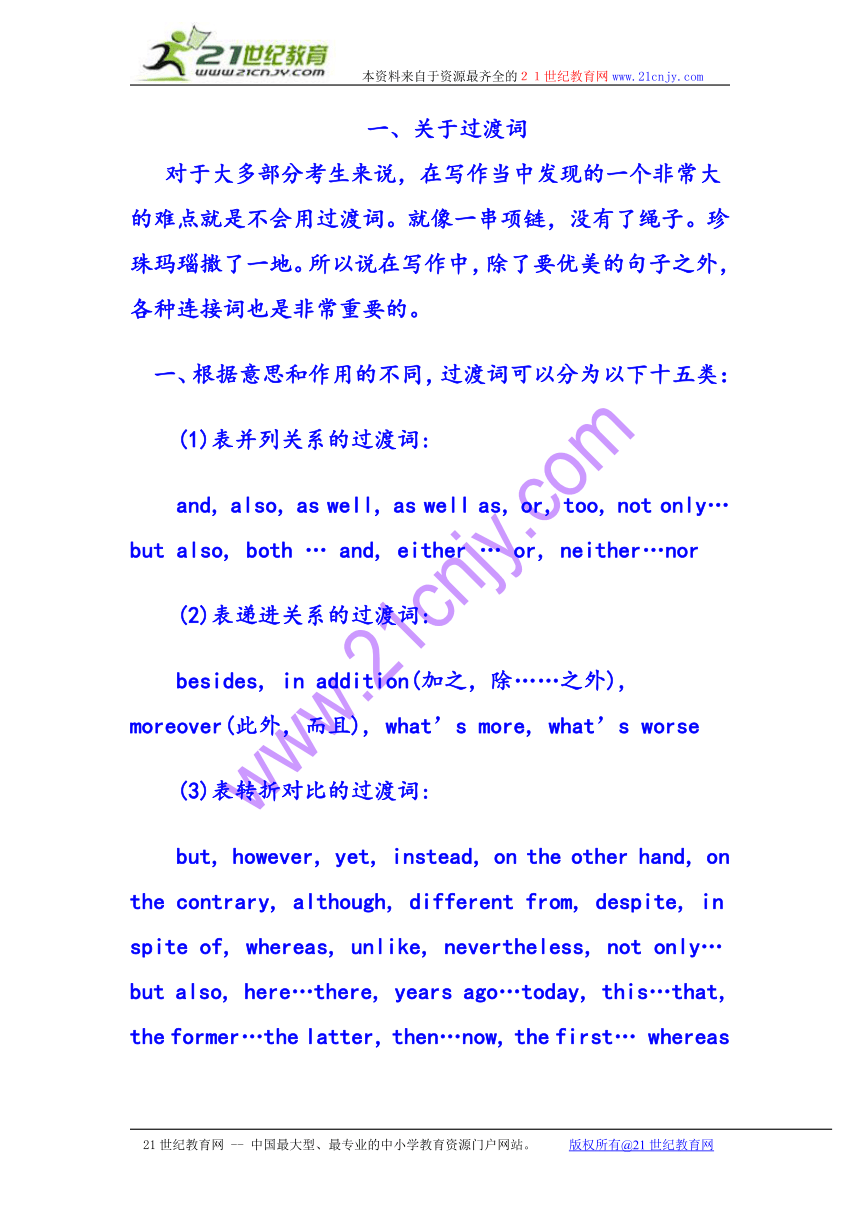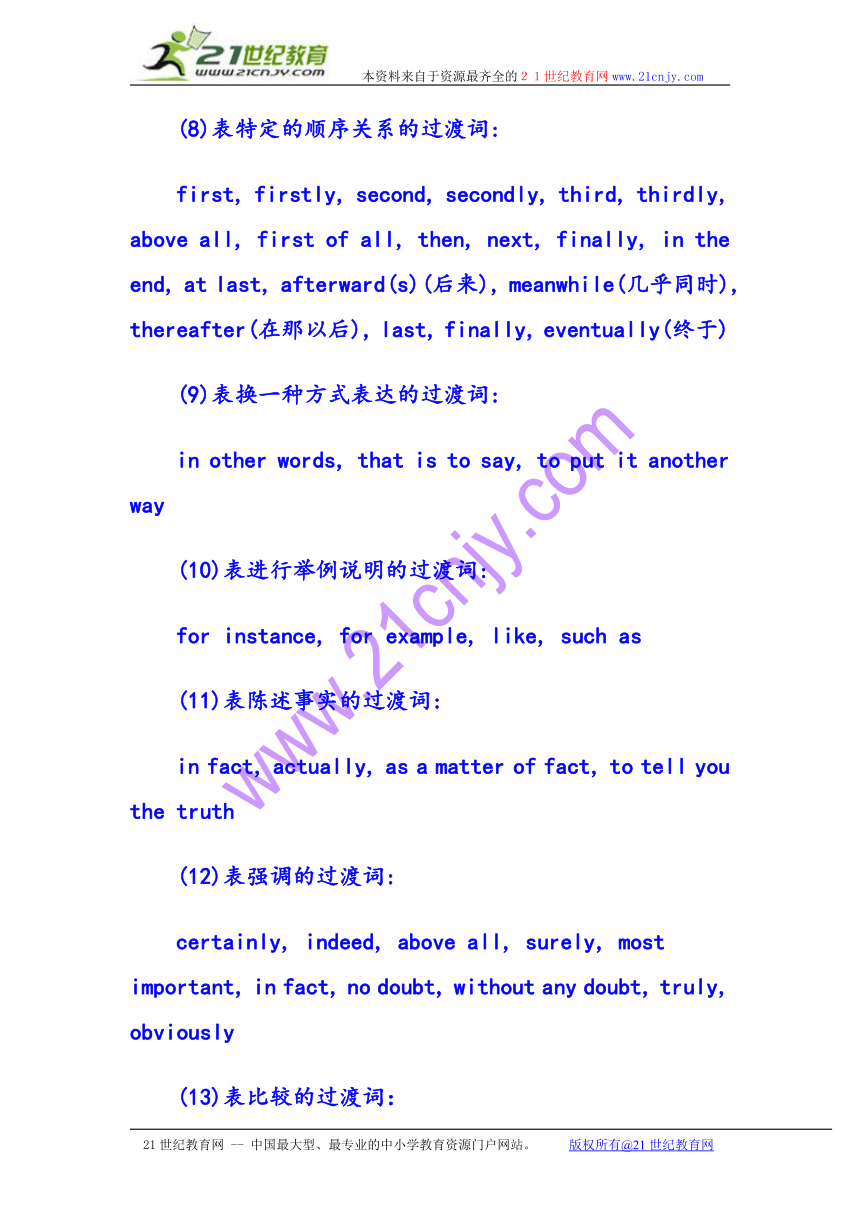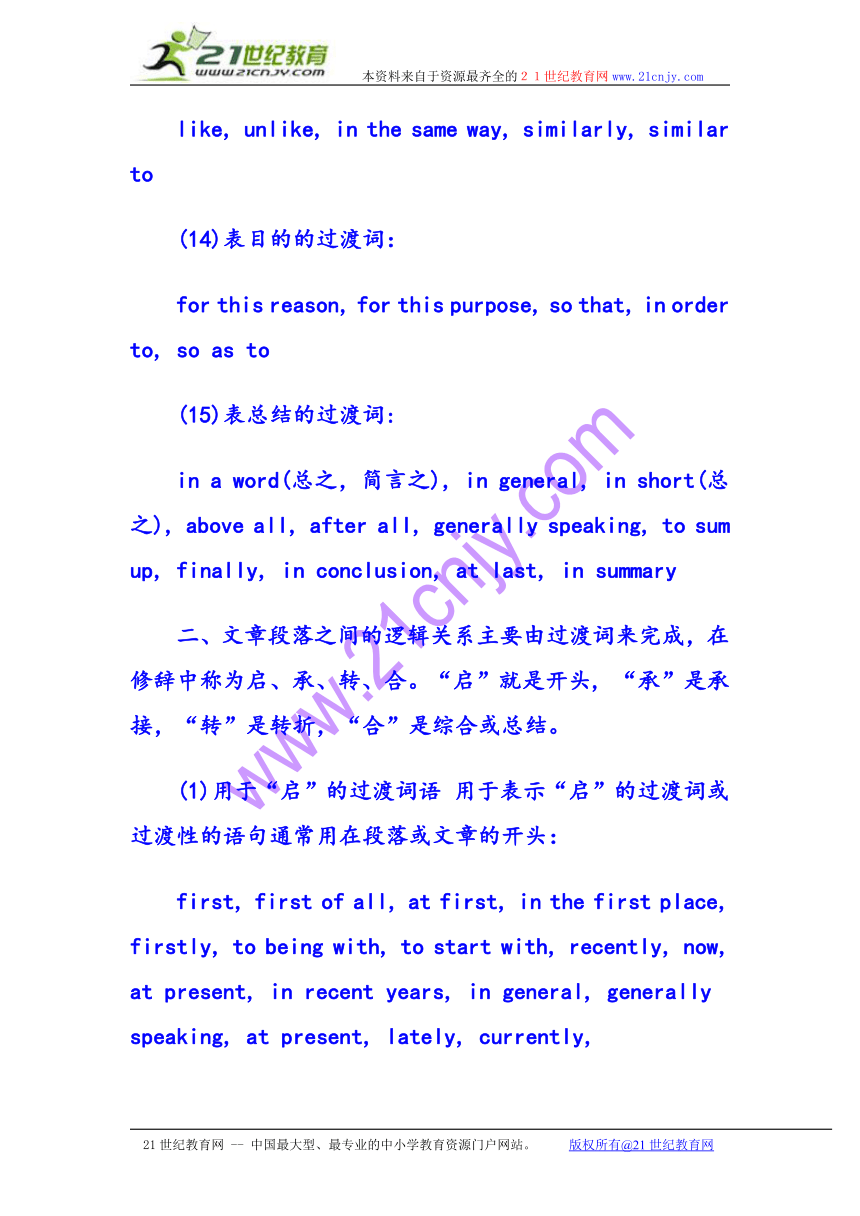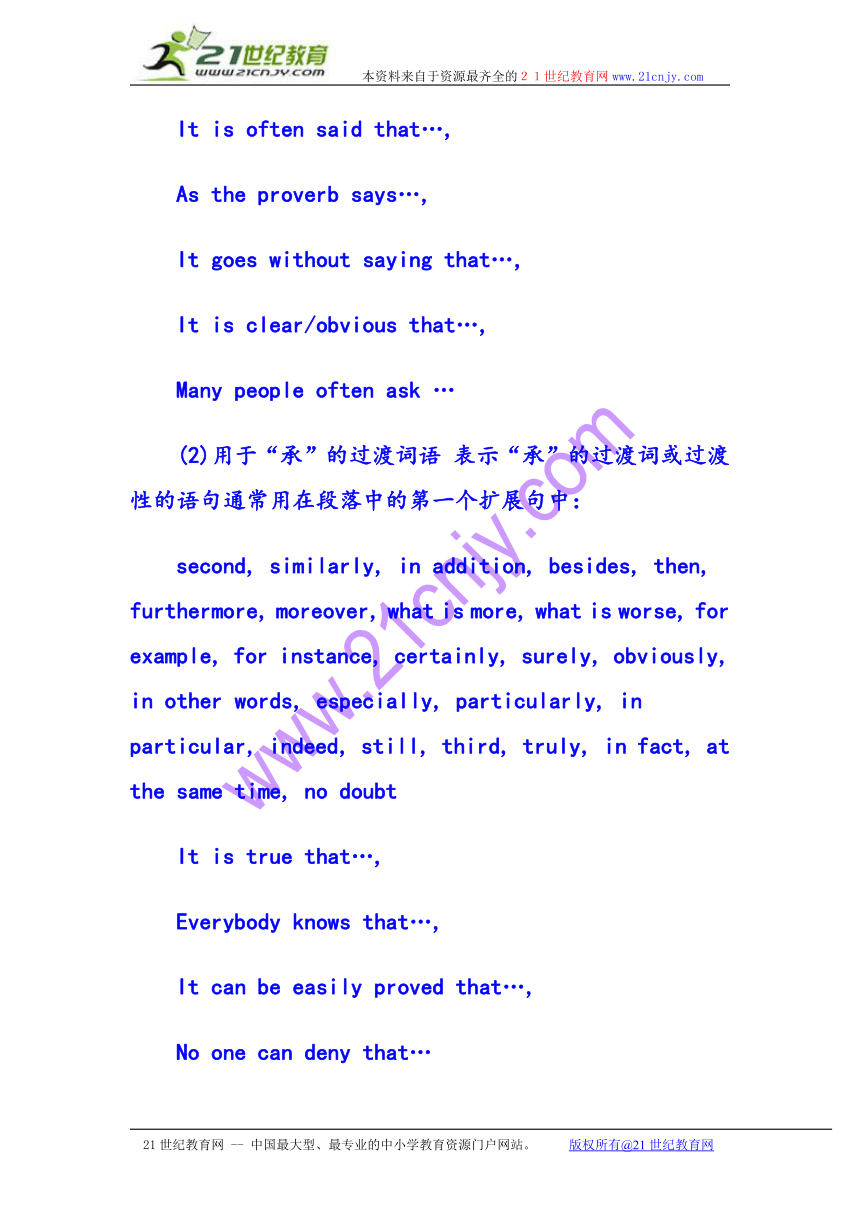英语过渡词应用分析及解答
图片预览





文档简介
本资料来自于资源最齐全的21世纪教育网www.21cnjy.com
一、关于过渡词
对于大多部分考生来说,在写作当中发现的一个非常大的难点就是不会用过渡词。就像一串项链,没有了绳子。珍珠玛瑙撒了一地。所以说在写作中,除了要优美的句子之外,各种连接词也是非常重要的。
一、根据意思和作用的不同,过渡词可以分为以下十五类:
(1)表并列关系的过渡词:
and, also, as well, as well as, or, too, not only…but also, both … and, either … or, neither…nor
(2)表递进关系的过渡词:
besides, in addition(加之,除……之外), moreover(此外,而且), what’s more, what’s worse
(3)表转折对比的过渡词:
but, however, yet, instead, on the other hand, on the contrary, although, different from, despite, in spite of, whereas, unlike, nevertheless, not only…but also, here…there, years ago…today, this…that, the former…the latter, then…now, the first… whereas the second, once…now, on the one hand…on the other hand, some…others
(4)表原因的过渡词:
because, because of, since, as, for, now that, thanks to, due to(由于)
(5)表结果的过渡词:
so, thus, therefore, as a result, so that, then, thereby, hence, so…that, such…that
(6)表条件的过渡词:
if, unless, on condition that, as/so long as
(7)表时间的过渡词:
when, while, after, before, until, as soon as, later, afterwards, soon, lately, recently, since, from then on, eventually, in the meantime, then, suddenly, at the same time, next, early this morning / year / century, after a while, in a few days, now, presently, finally, at last, all of a sudden, from now on, at present, immediately, the moment
(8)表特定的顺序关系的过渡词:
first, firstly, second, secondly, third, thirdly, above all, first of all, then, next, finally, in the end, at last, afterward(s)(后来), meanwhile(几乎同时), thereafter(在那以后), last, finally, eventually(终于)
(9)表换一种方式表达的过渡词:
in other words, that is to say, to put it another way
(10)表进行举例说明的过渡词:
for instance, for example, like, such as
(11)表陈述事实的过渡词:
in fact, actually, as a matter of fact, to tell you the truth
(12)表强调的过渡词:
certainly, indeed, above all, surely, most important, in fact, no doubt, without any doubt, truly, obviously
(13)表比较的过渡词:
like, unlike, in the same way, similarly, similar to
(14)表目的的过渡词:
for this reason, for this purpose, so that, in order to, so as to
(15)表总结的过渡词:
in a word(总之,简言之), in general, in short(总之), above all, after all, generally speaking, to sum up, finally, in conclusion, at last, in summary
二、文章段落之间的逻辑关系主要由过渡词来完成,在修辞中称为启、承、转、合。“启”就是开头, “承”是承接,“转”是转折,“合”是综合或总结。
(1)用于“启”的过渡词语 用于表示“启”的过渡词或过渡性的语句通常用在段落或文章的开头:
first, first of all, at first, in the first place, firstly, to being with, to start with, recently, now, at present, in recent years, in general, generally speaking, at present, lately, currently,
It is often said that…,
As the proverb says…,
It goes without saying that…,
It is clear/obvious that…,
Many people often ask …
(2)用于“承”的过渡词语 表示“承”的过渡词或过渡性的语句通常用在段落中的第一个扩展句中:
second, similarly, in addition, besides, then, furthermore, moreover, what is more, what is worse, for example, for instance, certainly, surely, obviously, in other words, especially, particularly, in particular, indeed, still, third, truly, in fact, at the same time, no doubt
It is true that…,
Everybody knows that…,
It can be easily proved that…,
No one can deny that…
The reason why …is that …,
There is no doubt that…,
To take…for an example (instance) …,
We know that…,
What is more serious is that…
(3)用于“转”的过渡词语 用于“转”的过渡词或过渡性的语句通常用在段落中的第二个扩展句中:
but, however, on the other hand, on the contrary, in contrast, in any case, at any rate(无论如何), nevertheless(虽然如此), otherwise, or, or else, while, whereas, but, despite, in spite of ..., yet, instead,
I do not believe that…,
Perhaps you’ll ask why…
This may be true, but we still have a problem with regard to…,
Though we are in basic agreement with …, yet differences will be found,
That’s why I feel that…
(4)用于“合”的过渡词语 用于“合”的过渡词或过渡性的语句通常用在段落的结论句或文章的结论段中:
in a word, in general, in short, above all, after all, generally speaking, to sum up, finally, in conclusion, at last, in summary, therefore, as a result, above all, thus,after all(毕竟), eventually, hence, in short, in conclusion, in a word, in sum(总之), on the whole(就整体而言), to sum up
From this point of view …
On account of this we can find that …
The result is dependent on …
Thus, this is the reason why we must…
最后,还是请考生注意一点,以上所给出的总结,首先是可以扩展的。以上只是一个思路。在运用的时候,一定要注意把握选择适合自己语言水平的。不要选择超出自己语言水平的思路。例如,我们冲泡一杯咖啡,如果用水去冲,那么就是一杯浓香的咖啡。但是如果用油去冲,那么,就成了咖啡粉和油的分层混合物了。我们选择适合我们自己语言水平的“模版”,就像当于我们用水去冲咖啡。咖啡粉就是模版,而我们的水就是实际的英语水平。
二、常见的连接词
连接词根据其本身的意思和文章连接所需要的逻辑意义可分为几类:
a.表示开场to begin with , in the first place , in general , generally speaking
b.表示总结to summarize , to sum up , to conclude , in conclusion , finally
c.表示举例a case in point , a good illustration / example of … is …,
d.表示原因because , since , for , the cause of , the reason for , now that
e.表示结果as a result , as a consequence , consequently
f.表示比较both , like , likewise , similarly , in common , in the same way
g.表示对照on the contrary , on the other hand , despite , in spite of , however
h.表示列举first , firstly , in the first place , first of all , to begin with
i.表示强调especially , particularly , certainly , surely , chiefly , actually
j.表示让步even though , although , in spite of , however , but , yet
三、有关选择题练习
1. He can speak English_______ Chinese.
A. but B. also C. so D. and
2. Physics is not so easy, _______I like it very much.
A. but B. or C. since D. because
3. Will Tom wait for her at home ______ at the library
A. or B. as C. so that D. both
4. She has a son _______ a daughter.
A. but B. and C. so D. or
5. I''ll give her the gift ______ she arrives.
A. so B. before C. as soon as D. since
6. Tom was ____ill that we had to send for a doctor.
A. so B. very C. and D. too
7. The woman was____ angry_____ she couldn''t speak anything.
A. neither…nor B. either…or C. both…and D. so…that
8. ______we got home it was very late.
A. When B. While C. Because D. As
9. We heard clearly_____ she said.
A. what B. which C. before D. because
10. I can''t sleep well at night, ______I often feel very tired in the day.
A. so B. because C. and D. or
11. When you''re learning a foreign language, use it, ______ you will lose it.
A. but B. or C. then D. and
12. --- Can you play football
--- Yes, I can, ______ I can''t play it very well.
A. or B. and C. but D. so
13. Study hard, ______ you will fall behind.
A. and B. but C. so D. or
14. My favorite is action movie ______ I think it''s exciting.
A. and B. because C. but D. so
15. The boy is very smart, ______ many of his classmates like him.
A. but B. so C. or D. for
16. He has never heard______ seen such a thing before.
A. nor B. and C. or D. since
17. _________ John _______I are policemen.
A. Neither ... nor B. Either ... or C. Both ... and D. Not only... but also
18. Mr Smith teaches ______well ______ his lessons are not easily forgotten.
A. very ... that B. quite ... but C. so ... as D. so ... that
19. He didn''t go to sleep ______he finished his homework.
A. till B. before C. after D. until
20. I didn''t buy the dictionary yesterday ________ my aunt would give me one.
A. until B. because C. if D. before
21. The runner fell _______ he quickly got up and went on running.
A. or B. and C. but D. down
22. Wait for me in the room _______ I come back.
A. until B. and C. so D. or
23. I''ll return the books to the library ______ soon as possible.
A. as B. so C. just D. but
24. Go along the road, _______ you''ll find the market at the end of it.
A. when B. and C. or D. though
25. You''ll be late ______ you don''t get up early tomorrow morning.
A. if B. when C. before D. until
26. It was late. She washed her face ______ went to bed.
A. or B. and C. so D. but
KEY:
1-5 DAABC 6-10 ADAAA 11—15 BCDBB
16-20 CADDB 21-26 CAABAB
21世纪教育网 -- 中国最大型、最专业的中小学教育资源门户网站。 版权所有@21世纪教育网
一、关于过渡词
对于大多部分考生来说,在写作当中发现的一个非常大的难点就是不会用过渡词。就像一串项链,没有了绳子。珍珠玛瑙撒了一地。所以说在写作中,除了要优美的句子之外,各种连接词也是非常重要的。
一、根据意思和作用的不同,过渡词可以分为以下十五类:
(1)表并列关系的过渡词:
and, also, as well, as well as, or, too, not only…but also, both … and, either … or, neither…nor
(2)表递进关系的过渡词:
besides, in addition(加之,除……之外), moreover(此外,而且), what’s more, what’s worse
(3)表转折对比的过渡词:
but, however, yet, instead, on the other hand, on the contrary, although, different from, despite, in spite of, whereas, unlike, nevertheless, not only…but also, here…there, years ago…today, this…that, the former…the latter, then…now, the first… whereas the second, once…now, on the one hand…on the other hand, some…others
(4)表原因的过渡词:
because, because of, since, as, for, now that, thanks to, due to(由于)
(5)表结果的过渡词:
so, thus, therefore, as a result, so that, then, thereby, hence, so…that, such…that
(6)表条件的过渡词:
if, unless, on condition that, as/so long as
(7)表时间的过渡词:
when, while, after, before, until, as soon as, later, afterwards, soon, lately, recently, since, from then on, eventually, in the meantime, then, suddenly, at the same time, next, early this morning / year / century, after a while, in a few days, now, presently, finally, at last, all of a sudden, from now on, at present, immediately, the moment
(8)表特定的顺序关系的过渡词:
first, firstly, second, secondly, third, thirdly, above all, first of all, then, next, finally, in the end, at last, afterward(s)(后来), meanwhile(几乎同时), thereafter(在那以后), last, finally, eventually(终于)
(9)表换一种方式表达的过渡词:
in other words, that is to say, to put it another way
(10)表进行举例说明的过渡词:
for instance, for example, like, such as
(11)表陈述事实的过渡词:
in fact, actually, as a matter of fact, to tell you the truth
(12)表强调的过渡词:
certainly, indeed, above all, surely, most important, in fact, no doubt, without any doubt, truly, obviously
(13)表比较的过渡词:
like, unlike, in the same way, similarly, similar to
(14)表目的的过渡词:
for this reason, for this purpose, so that, in order to, so as to
(15)表总结的过渡词:
in a word(总之,简言之), in general, in short(总之), above all, after all, generally speaking, to sum up, finally, in conclusion, at last, in summary
二、文章段落之间的逻辑关系主要由过渡词来完成,在修辞中称为启、承、转、合。“启”就是开头, “承”是承接,“转”是转折,“合”是综合或总结。
(1)用于“启”的过渡词语 用于表示“启”的过渡词或过渡性的语句通常用在段落或文章的开头:
first, first of all, at first, in the first place, firstly, to being with, to start with, recently, now, at present, in recent years, in general, generally speaking, at present, lately, currently,
It is often said that…,
As the proverb says…,
It goes without saying that…,
It is clear/obvious that…,
Many people often ask …
(2)用于“承”的过渡词语 表示“承”的过渡词或过渡性的语句通常用在段落中的第一个扩展句中:
second, similarly, in addition, besides, then, furthermore, moreover, what is more, what is worse, for example, for instance, certainly, surely, obviously, in other words, especially, particularly, in particular, indeed, still, third, truly, in fact, at the same time, no doubt
It is true that…,
Everybody knows that…,
It can be easily proved that…,
No one can deny that…
The reason why …is that …,
There is no doubt that…,
To take…for an example (instance) …,
We know that…,
What is more serious is that…
(3)用于“转”的过渡词语 用于“转”的过渡词或过渡性的语句通常用在段落中的第二个扩展句中:
but, however, on the other hand, on the contrary, in contrast, in any case, at any rate(无论如何), nevertheless(虽然如此), otherwise, or, or else, while, whereas, but, despite, in spite of ..., yet, instead,
I do not believe that…,
Perhaps you’ll ask why…
This may be true, but we still have a problem with regard to…,
Though we are in basic agreement with …, yet differences will be found,
That’s why I feel that…
(4)用于“合”的过渡词语 用于“合”的过渡词或过渡性的语句通常用在段落的结论句或文章的结论段中:
in a word, in general, in short, above all, after all, generally speaking, to sum up, finally, in conclusion, at last, in summary, therefore, as a result, above all, thus,after all(毕竟), eventually, hence, in short, in conclusion, in a word, in sum(总之), on the whole(就整体而言), to sum up
From this point of view …
On account of this we can find that …
The result is dependent on …
Thus, this is the reason why we must…
最后,还是请考生注意一点,以上所给出的总结,首先是可以扩展的。以上只是一个思路。在运用的时候,一定要注意把握选择适合自己语言水平的。不要选择超出自己语言水平的思路。例如,我们冲泡一杯咖啡,如果用水去冲,那么就是一杯浓香的咖啡。但是如果用油去冲,那么,就成了咖啡粉和油的分层混合物了。我们选择适合我们自己语言水平的“模版”,就像当于我们用水去冲咖啡。咖啡粉就是模版,而我们的水就是实际的英语水平。
二、常见的连接词
连接词根据其本身的意思和文章连接所需要的逻辑意义可分为几类:
a.表示开场to begin with , in the first place , in general , generally speaking
b.表示总结to summarize , to sum up , to conclude , in conclusion , finally
c.表示举例a case in point , a good illustration / example of … is …,
d.表示原因because , since , for , the cause of , the reason for , now that
e.表示结果as a result , as a consequence , consequently
f.表示比较both , like , likewise , similarly , in common , in the same way
g.表示对照on the contrary , on the other hand , despite , in spite of , however
h.表示列举first , firstly , in the first place , first of all , to begin with
i.表示强调especially , particularly , certainly , surely , chiefly , actually
j.表示让步even though , although , in spite of , however , but , yet
三、有关选择题练习
1. He can speak English_______ Chinese.
A. but B. also C. so D. and
2. Physics is not so easy, _______I like it very much.
A. but B. or C. since D. because
3. Will Tom wait for her at home ______ at the library
A. or B. as C. so that D. both
4. She has a son _______ a daughter.
A. but B. and C. so D. or
5. I''ll give her the gift ______ she arrives.
A. so B. before C. as soon as D. since
6. Tom was ____ill that we had to send for a doctor.
A. so B. very C. and D. too
7. The woman was____ angry_____ she couldn''t speak anything.
A. neither…nor B. either…or C. both…and D. so…that
8. ______we got home it was very late.
A. When B. While C. Because D. As
9. We heard clearly_____ she said.
A. what B. which C. before D. because
10. I can''t sleep well at night, ______I often feel very tired in the day.
A. so B. because C. and D. or
11. When you''re learning a foreign language, use it, ______ you will lose it.
A. but B. or C. then D. and
12. --- Can you play football
--- Yes, I can, ______ I can''t play it very well.
A. or B. and C. but D. so
13. Study hard, ______ you will fall behind.
A. and B. but C. so D. or
14. My favorite is action movie ______ I think it''s exciting.
A. and B. because C. but D. so
15. The boy is very smart, ______ many of his classmates like him.
A. but B. so C. or D. for
16. He has never heard______ seen such a thing before.
A. nor B. and C. or D. since
17. _________ John _______I are policemen.
A. Neither ... nor B. Either ... or C. Both ... and D. Not only... but also
18. Mr Smith teaches ______well ______ his lessons are not easily forgotten.
A. very ... that B. quite ... but C. so ... as D. so ... that
19. He didn''t go to sleep ______he finished his homework.
A. till B. before C. after D. until
20. I didn''t buy the dictionary yesterday ________ my aunt would give me one.
A. until B. because C. if D. before
21. The runner fell _______ he quickly got up and went on running.
A. or B. and C. but D. down
22. Wait for me in the room _______ I come back.
A. until B. and C. so D. or
23. I''ll return the books to the library ______ soon as possible.
A. as B. so C. just D. but
24. Go along the road, _______ you''ll find the market at the end of it.
A. when B. and C. or D. though
25. You''ll be late ______ you don''t get up early tomorrow morning.
A. if B. when C. before D. until
26. It was late. She washed her face ______ went to bed.
A. or B. and C. so D. but
KEY:
1-5 DAABC 6-10 ADAAA 11—15 BCDBB
16-20 CADDB 21-26 CAABAB
21世纪教育网 -- 中国最大型、最专业的中小学教育资源门户网站。 版权所有@21世纪教育网
同课章节目录
